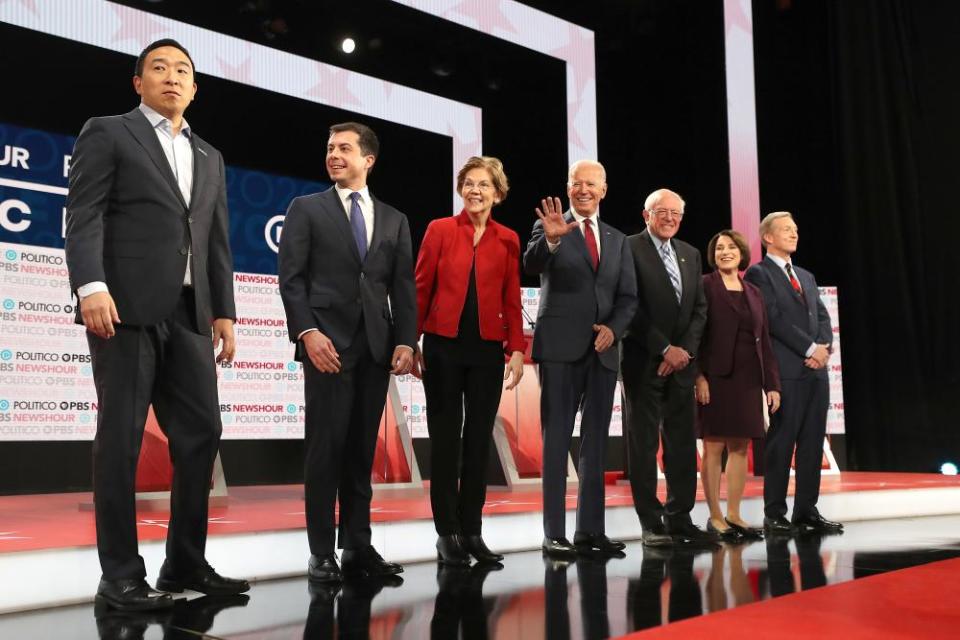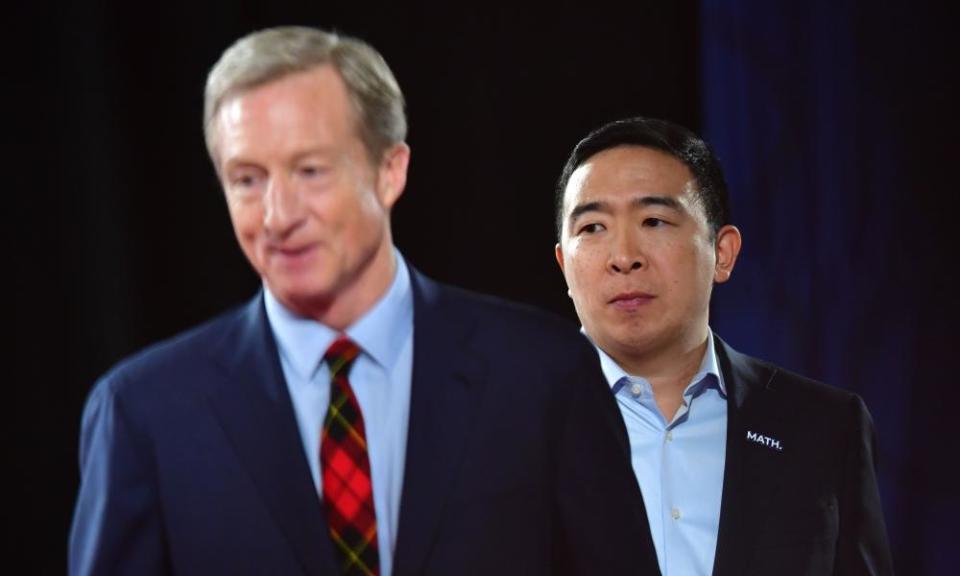Key debate takeaways: Democrats spar over fundraising and race
One day after the impeachment of Donald Trump, seven Democratic candidates for president faced off in Los Angeles in the final debate of 2020.
They battled for more than two and a half hours over some of the biggest problems facing America: climate change, inequality, racial injustice and who is most likely to win the race against Trump.
Here are some of the evening’s key moments.
Pete Buttigieg gets attacked on fundraising and experience
One of the most heated exchanges of the night came between the South Bend, Indiana, mayor Pete Buttigieg and Senator Amy Klobuchar of Minnesota, who questioned whether the mayor has enough experience to take up the highest office in the land. The attack wasn’t entirely unexpected, with both candidates touting a centrist agenda and Buttigieg polling well in early primary states such as Iowa and New Hampshire.
Elizabeth Warren, too, zeroed in on the mayor, continuing an ongoing argument over fundraising tactics. The senator of Massachusetts attacked Buttigieg for a recent fundraiser at a private winery in Napa, California arguing, “billionaires in wine caves should not pick the next president”. The mayor responded that he was the only person on the stage who was not a millionaire.“Senator, your net worth is worth 100 times mine,” he shot back.
Klobuchar, meanwhile, got in a humorous dig in by saying she had never been to a “wine cave” but had been to a “wind cave”, an apparent reference to the South Dakota national park. Discussions of “wine caves” quickly trended on social media, sparking jokes and memes.
A glaring lack of diversity

Just seven candidates made the stage on Thursday, making it the smallest debate lineup so far. With Senator Kamala Harris dropping out of the race and senators Corey Booker and the former housing secretary Julián Castro failing to qualify for the debate, the stage was also the whitest yet. When asked about the lack of diversity on the stage,entrepreneur Andrew Yang aptly responded, “It’s both an honor and a disappointment to be the lone candidate of color on the stage tonight.”
Yang used the opportunity to pitch his universal basic income proposal, arguing candidates of color would do better if more people had disposable income to support candidates.
Bernie Sanders tried to reframe the question as one about climate change, prompting a rebuke from moderator Amna Nawaz. “With all due respect, this question is about race. Can you get back to the question?” she said.
Joe Biden doesn’t commit to running for a second term
In a discussion about the age of the older candidates, former vice-president Joe Biden was asked about reports he might not run for a second term if elected president: “I’m not even elected one term yet … Let’s see what happens.” He also defended his age, saying, “I’m running because I’ve been around. I have more experience.”
When Sanders was asked about concerns about older, white male candidates in the race, he said, “The issue is not old or young, male or female, the issue is working people standing up taking on the billionaire class.”
Warren got one of the loudest applause moments of the night when Tim Alberta from Politico noted she would be the oldest person to be inaugurated and responded: “I’d also be the youngest woman ever inaugurated.”
Lasting questions on reparations and racism
Racism and discrimination were among the key issues of the night.
Asked whether he supports reparations, Biden lauded the contributions of immigrants but didn’t directly answer the question. Buttigieg said he supported proposed legislation to study reparations.
PBS reporter Yamiche Alcindor asked Amy Kolbuchar what she would say to white Americans uncomfortable with the idea of living a minority-majority country. “I’d say: This is America,” Klobuchar said, before arguing how she’d address economic inequality and voter suppression.
Little discussion of impeachment
Trump on Wednesday became the third president in US history to be impeached, but discussion of the president’s upcoming trial in the Senate for obstruction and abuse of power played a minimal role in the debate. The first question of the night was on impeachment, prompting predictable answers from the candidates about Trump’s corruption.
The candidates did not return to the subject.
More air time for Andrew Yang and Tom Steyer

The small debate stage offered candidates who had trouble standing out in previous debate more time to make their case. Yang seemed confident and comfortable in the bigger spotlight, and received positive reactions from the crowd. Steyer got more speaking time than he had in the past, but didn’t have any clear breakout moments.
Yang drew attention with a skeptical stance on Trump’s impeachment. “We have to stop being obsessed over impeachment, which, unfortunately, strikes many Americans like a ball game where you know what the score is going to be, and actually start digging in and solving the problems that got Donald Trump elected in the first place,” he said.
He also criticized media outlets for “missing a reason” Trump was elected: “If your turn on cable network news today, you would think he’s our president because of some combination of Russia, racism, Facebook, Hillary Clinton, and emails all mixed together,” rather than vanishing manufacturing jobs in swing states.
Yang also prompted smiles at the debate’s close, when he paused, puzzled, when asked what apology or gift he would offer to another candidate.
“I would love to give each of you a copy of my book,” he quipped, sparking a big laugh from the audience. “If you like data, this book is for you!”

